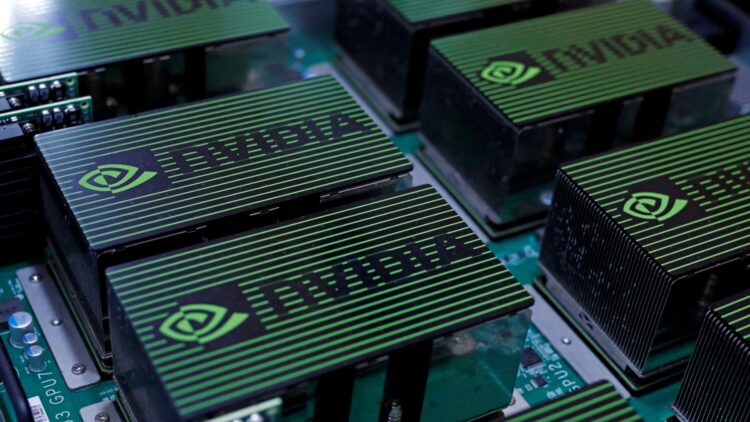A recent, somewhat unprecedented agreement may be signed between the United States and Nvidia regarding the supply of artificial intelligence chips to China. The countries, rivals in the dispute over AI technological advances, become, to a certain extent, trading partners in the supply of chips, but under some conditions.
Revenue agreement in exchange for export licenses
U.S. President Donald Trump on Monday suggested he might allow Nvidia NVDA.O to sell a scaled-down version of its next-generation advanced GPU chip in China, despite deep-seated fears in Washington that China could harness U.S. artificial intelligence capabilities to supercharge its military. The move could open the door to China securing more advanced computing power from the U.S. even as the two countries battled for technology supremacy, critics said.
“Jensen (Huang, Nvidia CEO) also has the new chip, the Blackwell. A somewhat enhanced-in-a-negative-way Blackwell. In other words, take 30% to 50% off of it,” Trump told reporters in an apparent reference to slashing the chip’s computing power.
Earlier, the Trump administration confirmed an unprecedented deal with Nvidia and AMD AMD.O to give the U.S. government 15% of revenue from sales of some advanced chips in China. The move sent shivers across Washington, where China hawks of both parties have long sought to keep Beijing generations behind U.S. AI technology.
Nvidia prepares reduced chip for China — access without compromising advanced technologies
While H20, considered obsolete by Trump, is being sold again, more advanced chips like Blackwell remain under restriction or subject to new negotiations — with performance cuts of up to 50%, as declared by the president.
Reuters in May reported that Nvidia was preparing a new chip for China that was a variant of its most recent state-of-the-art AI Blackwell chips at a significantly lower cost. Nvidia has not disclosed the existence of the chip, or its capabilities compared with its U.S. offerings.
Trump pushes for revenue share and reduces control over intermediate chips
Trump on Monday defended the agreement calling for Nvidia and AMD to give the U.S. government 15% of revenue from China sales, after his administration green-lighted exports to China of less advanced AI chips known as the H20 last month. The Trump administration halted sales of Nvidia’s H20 chips to China in April, but the company said last month it had won clearance to resume shipments and hoped to start deliveries soon.
“The H20 is obsolete,” Trump said on Monday, arguing China already had it. “So I said, ‘Listen, I want 20% if I’m going to approve this for you, for the country.'”
The imposition of taxes by the government characterizes the commercial relationship with government intervention in the company’s business models to meet political needs. However, this practice also generates criticism because it limits the company’s profit margin and provides arguments for other types of negotiations in the technology sector.
The deal is extremely rare for the United States and marks Trump’s latest intervention in corporate decision-making, after pressuring executives to invest in American manufacturing and demanding the resignation of Intel’s INTC.O new CEO, Lip-Bu Tan, over his ties to Chinese companies.
Exports released with financial conditions
The U.S. Commerce Department has started issuing licenses for the sale of H20 chips to China, a U.S. official said on Friday. Washington does not feel the sale of H20 and equivalent chips compromises national security, a second U.S. official told Reuters on Sunday.
The deal is a classic example of political intervention in the market. By selling at a cut in government revenue, the scope of state influence in the private sector is extended. The maneuver may guarantee Chinese access to currently restricted technology — to the economic benefit of companies — but it also represents a balancing act with national security concerns.
GCN.com/Reuters


